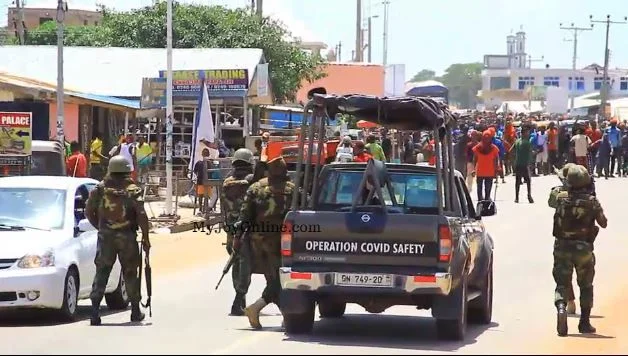In 2021, the town of Ejura in Ghana became the center of national attention due to a tragic incident involving the killing of civilians during a protest.
The protest erupted following the death of Ibrahim Mohammed, also known as Kaaka, a social activist and member of the FixTheCountry movement.
Kaaka’s death, believed to be the result of a mob attack, spurred the community into action, demanding justice and accountability. Tensions escalated, leading to a demonstration by the youth of Ejura.
In response to the protest, the police and military were deployed to maintain order. However, the situation turned deadly when security personnel opened fire on the crowd, leading to the deaths of two civilians and injuries to several others. This excessive use of force by the security agencies sparked outrage across the country.
A law firm has now filed a lawsuit against the Ghana Armed Forces and the police, seeking accountability for the brutal actions taken by the security forces during the protest.
The lawsuit emphasizes the violations of human rights, including the unlawful killings and the physical harm inflicted on protesters.
The firm argues that the use of live ammunition on unarmed civilians was not only disproportionate but also a breach of both national and international law.
The involvement of the army and police in this incident has been heavily criticized, with many questioning why armed military forces were deployed to handle what started as a peaceful demonstration.
The Ashanti Regional Minister later admitted to authorizing the military deployment, which further fueled the public outcry.
In the aftermath of the killings, a government-formed committee was tasked with investigating the events. The committee’s findings were met with mixed reactions, as some, including the family of Kaaka, rejected the report, arguing that it did not deliver true justice.
Various organizations, including the National Peace Council, also called for professionalism and restraint in handling public demonstrations, urging a comprehensive review of how security forces engage with civilians during protests.
The lawsuit by the law firm aims to hold the security forces accountable for their actions, seek compensation for the victims, and ensure that such brutalities are prevented in the future.
The law firm pursuing the case against the Ghana Police Service and the Ghana Armed Forces highlights several key points in their legal action, primarily focusing on the disproportionate and excessive use of force during the Ejura protests in 2021.
The firm argues that the actions of the security personnel amounted to serious human rights violations, particularly the right to life and freedom from cruel and inhumane treatment.
The involvement of the military in what was initially a peaceful protest has been at the core of public debate. Eyewitness reports indicated that the crowd was unarmed and protesting peacefully when the army and police arrived.
Video footage from the event shows security forces opening fire, leading to the deaths of two individuals: Murtala Mohammed and Abdul Nasir, who were both young men. Several others were injured during the incident, which escalated tensions further.
The law firm points out that the killing of civilians by the state forces was not just an act of negligence but a deliberate abuse of power. This argument is bolstered by the testimony of survivors and eyewitnesses, who claim that the security forces did not attempt to de-escalate the situation but instead resorted to violent measures.
The firm also argues that the deployment of the military in handling civilian protests was unnecessary and illegal, as the police should have been capable of managing the situation without lethal force.
Following the brutal response by the security forces, the government faced widespread criticism from civil society organizations, human rights groups, and political figures.
Public trust in the security agencies diminished as the killings were seen as symptomatic of a broader issue of excessive militarization and lack of accountability in law enforcement.
The lawsuit is not just about financial compensation for the victims but also seeks to bring systemic changes in how the security forces operate in Ghana, particularly when dealing with civilian protests.
The legal action aims to ensure that future protests are handled with the restraint and professionalism expected of law enforcement agencies in a democratic society.
By holding the police and military accountable, the law firm hopes to deter similar incidents in the future and ensure justice for the families of those who lost their lives during the Ejura killings.
The lawsuit also serves as a reminder of the need for ongoing reform within Ghana’s security apparatus to prioritize human rights and uphold the rule of law in all circumstances.




















